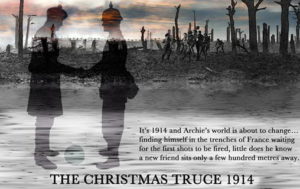World War I was one of the most brutal military encounters in the history of the world. While weapons had advanced, the military strategy hadn’t. Soldiers dug trenches where they would fire at the enemy. Often the trenches were so close that the opposing side could smell what the enemy was eating.
With the Christmas season approaching in 1914, Pope Benedict called for a temporary truce. Military leaders, however, were opposed. But soldiers had their own ideas. They started singing songs to each other, often songs that were in the other side’s language.
Then a German soldier left his trench and approached the other side. Then soldiers on both sides left their trenches to join the other side. Military leaders were not happy. Tens of thousands of soldiers defied their leaders and joined in a hope for peace.
Why did such a benevolent hope exist in such a horrible time? Actually, the closeness of combat humanized the war as much as it brutalized the conflict. Each side faced the same awful conditions. There became a comradery in shared misery.
Small sources of shared belonging began to emerge. Shooting would stop at mealtime. When the weather was intolerable, neither side took advantage of efforts to make the living conditions more tolerable. Deliveries of food were considered unacceptable targets by both sides. The recovery of the dead and wounded was also permitted. They even helped each other bury their dead.
Leadership on both sides tried to perpetuate the atrocities of the battles. There were efforts to dehumanize the other side. But the soldiers on the front line saw the need for some form of basic humanity in spite of the fighting taking place.
Hope is a force that leadership cannot squelch. It exists in even the most difficult times. Those who try to promote themselves by enflaming fears and grievances will eventually lose the hopes of those who are on the “front lines”. Hope will overcome divisiveness spurred on by leaders who have no moral compass.
We can learn a lot about hope from those in the trenches in World War I. We should also be wary of people like one German soldier who saw the Christmas truce as a betrayal of German honor. His name was Adolf Hitler.
* * *
